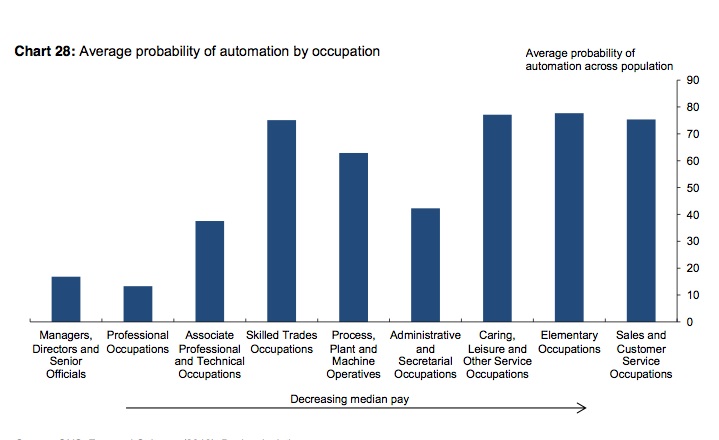The robots are coming
https://www.theguardian.com/business/2015/nov/12/robots-threaten-low-paid-jobs-says-bank-of- england-chief-economist
The Bank of England has warned that up to 15m jobs in Britain are at risk of being lost to an age of robots where increasingly sophisticated machines do work that was previously the preserve of humans.
Andy Haldane, the bank's chief economist, said automation posed a risk to almost half those employed in the UK and that a "third machine age" would hollow out the labour market, widening the gap between rich and poor.
The results of a Bank of England study, Haldane added, suggested that administrative, clerical and production tasks were most at threat.
In a speech to the umbrella organisation for Britain's trade unions, the TUC, he asked if the Luddites -- reputed to have smashed machines during the Industrial Revolution -- had been proved right two centuries on.
"Technology appears to be resulting in faster, wider and deeper degrees of hollowing-out than in the past," he said.
"Why? Because 20th-century machines have substituted not just for manual human tasks, but cognitive ones too.
The set of human skills machines could reproduce, at lower cost, has both widened and deepened."With machines becoming ever smarter, Haldane said a wider array of jobs were at risk from automation than in the past. Low-paid jobs were most at risk, but the "hollowing out" would increasingly affect mid-skill jobs as well. Haldane said the Bank had used methodology pioneered in the US to model the impact of smarter machines on the UK labour market and its more than 30 million employees. Advertisement It classified jobs into three categories -- those with a high (greater than 66%), medium (33-66%) and low (less than 33%) probability of automation, and made an adjustment for the proportion of employment those jobs represented.
"For the UK, roughly a third of jobs by employment fall into each category, with those occupations most at risk including administrative, clerical and production tasks.
"Taking the probabilities of automation, and multiplying them by the numbers employed, gives a broad brush estimate of the number of jobs potentially automatable. For the UK, that would suggest up to 15m jobs could be at risk of automation."
Haldane said the first industrial revolution had occurred in the middle of the 18th century and the second in the latter half of the 19th century.
The third industrial evolution -- the era of information technology -- appeared to have resulted in an intensification of trends seen in the first two: "a hollowing-out of employment, a widening distribution of wages and a fall in labour's income share.
The key question is what happens next? A re-run of the 19th century, with productivity gains eventually boosting wages and the labour share? Or, different than in the past, a permanent re- shaping of the labour landscape?"
The Bank's chief economist said technological advances since the 18th century had always had the effect of widening the gap between the skilled and unskilled, but there were signs that this process was speeding up. Haldane added that as technology improved, there was a greater likelihood that "the space remaining for uniquely human skills could shrink further". He said: "If these visions were to be realised, however futuristic this sounds, the labour market patterns of the past three centuries would shift to warp speed.
"If the option of skilling up is no longer available, this increases the risk of large scale un- or under-employment.
The wage premium for those occupying skilled positions could explode, further widening wage differentials."
And labour's share of the pie could fall even more dramatically than in the past. "On this view, the tree would be so thoroughly hollowed-out that it may no longer be able to support itself." Artificial intelligence: ‘Homo sapiens will be split into a handful of gods and the rest of us'
Haldane said the increasing automation of the workplace might already be helping to depress wage growth, explaining why inflation has consistently undershot the government's 2% target.
The Bank's official forecast is for inflation to return to 2% in two years' time, but Haldane said this assumed that labour's share of national income recovered to its pre-crisis trend. If it did not do so, inflation would rise to 1.6%, a level that would not justify the Bank's MPC voting for higher interest rates.
"Against that backdrop, my view is that the case for raising interest rates is still some way from being made. Whatever the reason, the economic aircraft appears to be losing speed on the runway. That is an awkward, indeed risky, time to be contemplating takeoff."
